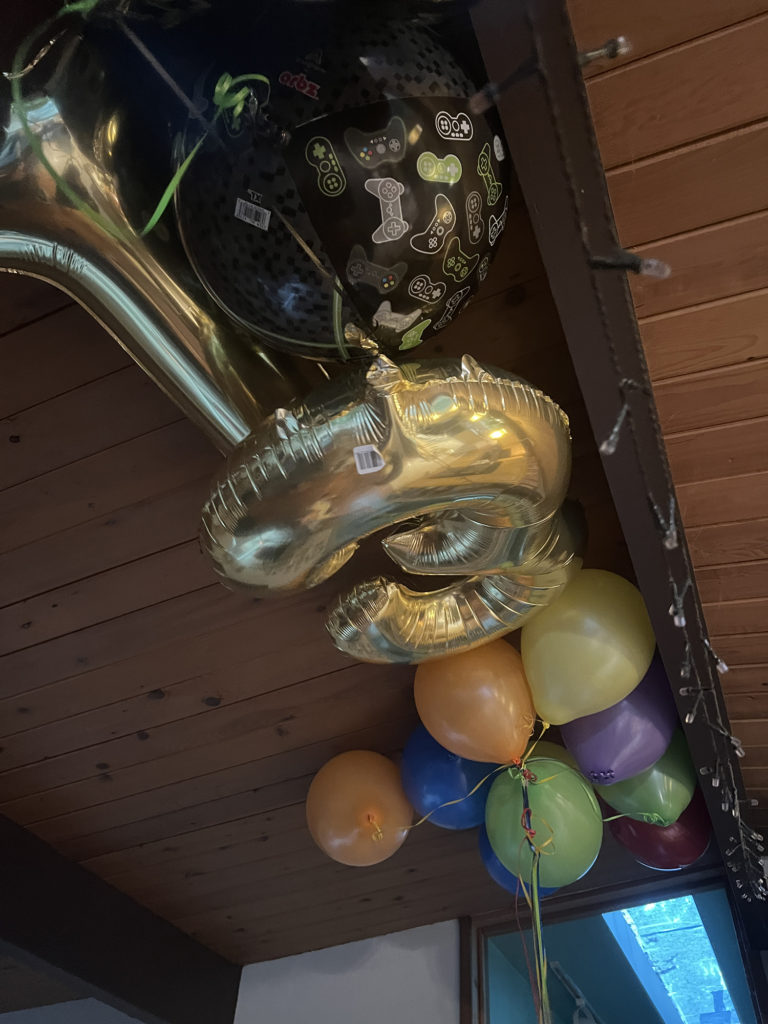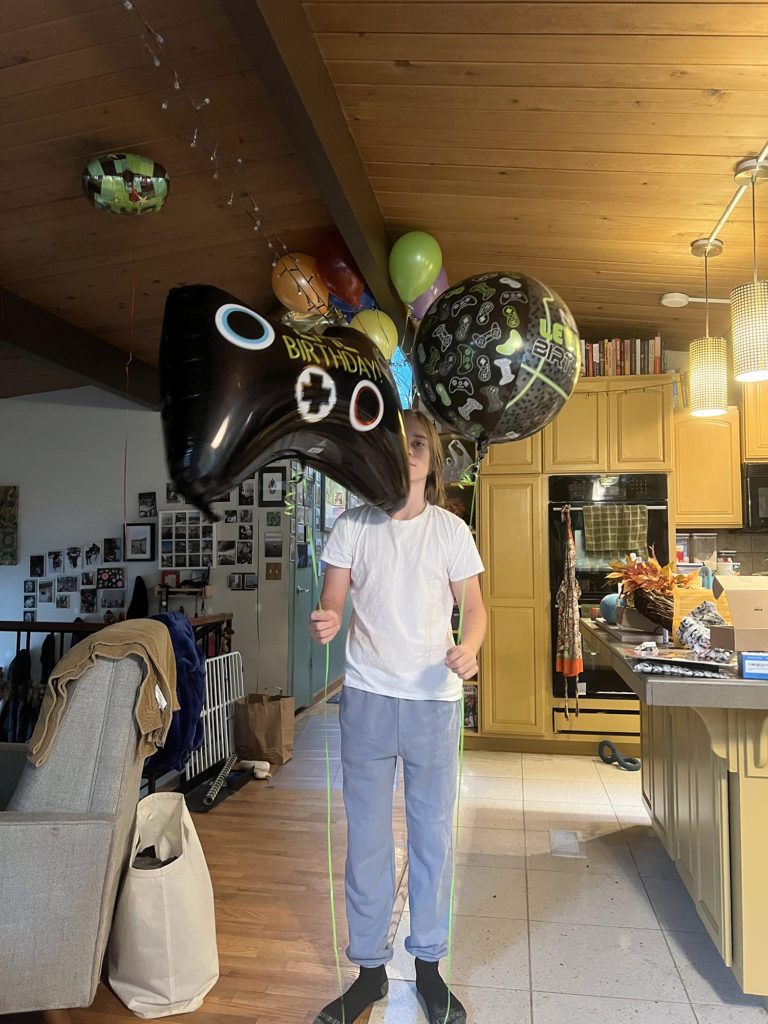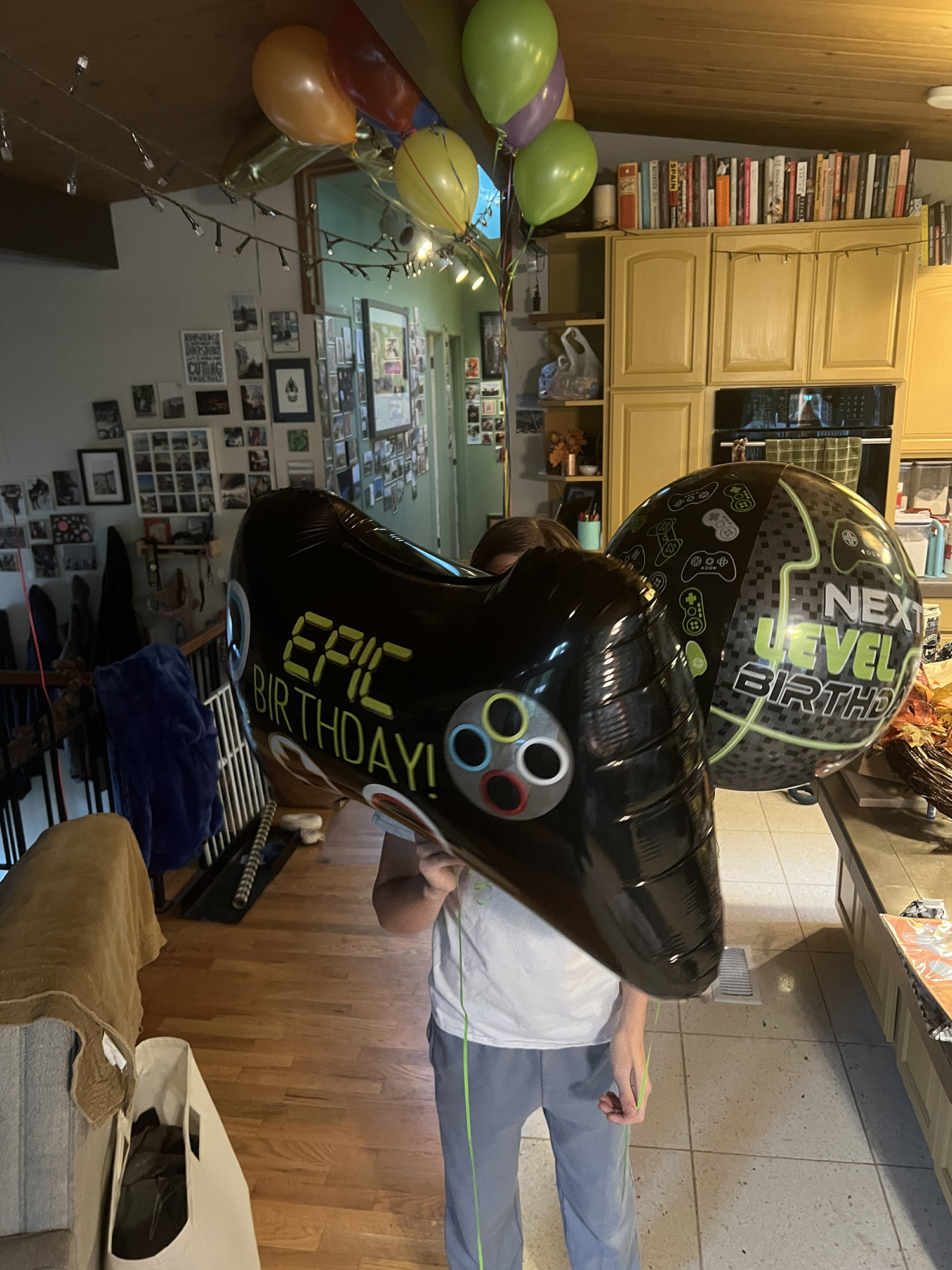My son! turned thirteen! yesterday!
The meaning is arbitrary, really, but all the same, it has significance.
Throughout my life, even long before my son, I’ve been infamous for my non-traditional ways. I’ve questioned (and continue to question) everything, and I’ve never been able to do things that simply don’t make sense or that don’t work for me. “Because this is how it’s always been done” is never an acceptable response.
When my son was very young, I really struggled. Not because parenting was hard or my son was difficult, but because I found myself in the deep end of an identity crisis. And really, it wasn’t that bad when he was a baby, because I had a great time with him when he and I were doing our own thing. My husband worked long hours, so I took The Kid to the zoo, having entire conversations with my tiny little human in his stroller, telling him I couldn’t wait for him to be older to tell me what was on his mind. We wandered the aisles of the grocery store, where I talked to him about foods he’d try some day. Or, because I loved to spend time cooking, I’d prop him up on his little bouncy seat on the kitchen island to talk him through all my dinner prep—and he’d always watch me, wide-eyed and serious, occasionally babbling shrieking with delight as he waved his hands in the air. I’m not the type of person that does baby talk, so we just had long, serious “conversations” all day every day.
I eventually acknowledged that it would probably be good for me to have some time to myself occasionally (even though I don’t think I needed it that badly then), and I wanted him to make some friends his own age. So we enrolled him in Montessori preschool, where he stayed through kindergarten. He loved that first school, because it was familiar and routine and he saw all the same kids every day for three years. I loved that first school because his teacher really “got” him; she saw him as I did—an exceptionally bright and curious, quirky, sensitive kid with a ton of creativity.
Those days were good for him, but that’s when it got really hard for me.
Going to preschool meant I had to socialize, too. Since he “traveled” through preschool to kindergarten in the same room with the same kids for those three years, the parents also socialized—play dates, holiday events, school events. I wasn’t interested in the other parents or the group dynamics, but having struggled and been ostracized as the “weird kid” throughout my own school experience, I wanted my son to have a better experience. I forced myself to participate and go to their houses and play along for his sake. I didn’t like or dislike the other parents. Most of them were fine—I just felt so uncomfortable around them, never feeling like I fit in. I didn’t have the same priorities, I didn’t care about the same things, I didn’t want to do things the same way. And throughout those years, I perfected my fake smile, exhausted myself feigning enthusiasm, spent my free time doing things that weren’t my choice. I “hmm-d” and nodded my way through kindergarten and public school conversations. I allowed my husband, son, and I to be swept up into a little group of parents and kids who had frequent picnics and get-togethers, watching all the dramas unfold between them, cataloguing the personalities so I’d know how to “be” for each of them.
Things blew up eventually, as they always do when you’re trying to force things. But it wasn’t until my son started struggling in public school that I cast off my concerns of fitting in. I stopped worrying about being “that parent” and started researching and advocating for him. I pushed back, hard, on everything that didn’t make sense until I finally yanked him out of everything to start homeschooling. (And without going into too much detail, for the sake of his privacy, it turns out I was right about everything. Gifted, ADHD, and autistic just like me. So much so that the director of the last school we tried emailed me to tell me she admired how I fought for him, and that it spurred her to bring in specialists to see why so many of the “bright” kids there were struggling—and they discovered other kids with dyslexia and other learning differences.)
We began homeschooling about 5 years ago, and he has thrived in ways I couldn’t even imagine. He plays with all the kids in the neighborhood who are younger, and their parents often stop us to tell us how incredible he is with their kids. How patient and kind he is. How polite he is. He takes “unaccompanied minor” flights to visit his grandmom frequently, and every single time my mom picks him up at the airport, the flight attendants and some other passengers tell her how wonderful he is. When you homeschool your kid, people inevitably whine at you “what about socializing?”—well, this kid is a serious extrovert, and he knows it. He’s friends with the baristas at our local Starbucks. He’s friends with one of the cashier’s at the nearby Bartell’s—they always have conversations about video games and movies and sci-fi space concepts.
I could write a novel about all the ways people think he’s amazing. And personally, I love his independence. I love his thoughtfulness. And I love how confident he is in challenging the status quo and pushing back. I value that he doesn’t just fall in line, even if it means giving ME a hard time. (I used to worry that he was too much of a rule follower when he was little. He grew out of it, and I love when he argues with me or refuses to do something and explains why.) I never wanted a “mini-me” (I find that term so offensive)—I wanted an independent thinker. When we told people we were homeschooling, the most common response was “I could never spend that much time with my kid.” Honestly, that’s one of the things I love about homeschooling—I’ve always enjoyed time with him. I still do, and I treasure it even more since he’s getting older and we spend less time together. I think my son is freakin’ fantastic.
I could tell you what a genius he is. I could tell you how Husband takes him to PAX, where he plays all the demo games and has the developers looking at him in amazement. They tell Husband that he plays the games and figures them out better than 80% of anyone else. He’d never been able to do math worksheets and exercises in school, but he whips out complicated math in his head and does Youtube videos explaining the new physics engines in such and such game. He has this entire community of people he plays with regularly, and blows through campaigns in record time—but then he’ll sit down and patiently walk his grandmother through “Call of Duty” so they can play together when she visits. (True story! And kudos to her—but she’s as amazed by him as I am.)
I could tell you about his wicked sense of humor which is sharper than even mine. And that he, like me, is a hardcore information seeker; information is our love language.
One of the ways I’m non-traditional is that I view him as an equal, not a “child” or a “mini-me” or as “my” anything that sounds like he’s my possession. We give him a TON of freedom—so much so that I think it would terrify other parents, but that the freedom he’s been given has taught him to figure out who he is and to be self-aware enough to make smart decisions. (He goes to bed when he’s tired, and I’m shocked at what a reasonable hour that is. He exercises and gets outside regularly, of his own volition. He eats healthily. He tries new things. And on and on.) He has confidence because we’ve shown him that we trust him.
But the thing I really want to share and the purpose of this post is to say that he has truly been the greatest teacher in my life. I have always been ostracized or viewed as “weird” for doing everything so differently. And I tried so hard to force myself into a little normal box when he was young. I thought I was doing it for his sake. I thought it would be better for all of us if I tried harder to be a “normal” or “traditional” parent. But he showed me that I have always been right to follow my instincts, to challenge the status quo, and that no one knows my family better than I do. He showed me that it’s not just ok but GOOD to be different. He taught me to never doubt myself—or him—again.



